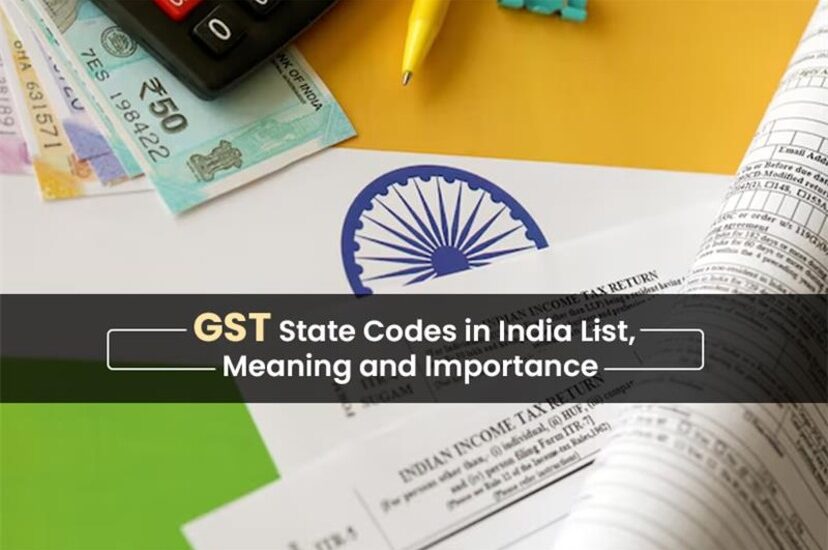- November 7, 2025
- Posted by: admin
- Categories: Goods and Services Tax, Blog

Goods and Services Tax (GST) is one of the most significant tax reforms in India, introduced to unify indirect taxes under a single system. Every registered taxpayer under GST receives a unique Identification Number known as (GSTIN), a part of which includes the GST State Code. In this post, we will explore what GST state codes are, why they matter, how to identify them, and a full list of all state codes in India.
What Are GST State Codes?
GST State Codes are two-digit numerical codes assigned to every Indian state and union territory by the government. These codes form the first two digits of a GSTIN.
For Example, in the GSTIN: 27ABCDE1234F1Z5, “27” represents Maharashtra’s GST State Code.
Therefore, every GSTIN begins with a state code that indicates the location where the business is registered.
What is the Structure of a GSTIN
A GSTIN is a 15-digit alphanumeric number allotted to each taxpayer. Here’s the breakdown:
| Digit | Description |
| 1–2 | State Code (based on the Indian Census 2011) |
| 3–12 | PAN of the taxpayer |
| 13 | Entity code (for multiple registrations under one PAN in the same state) |
| 14 | Blank by default (usually “Z”) |
| 15 | Check code (used for error detection) |
Why Are GST State Codes Important?
GST state codes are more than just numbers; they serve several key purposes:
- Identification of Business Location: Helps determine where the business is registered and operating.
- GST Return Filing Accuracy: The correct state code ensures that taxes are credited to the right state’s GST account.
- Invoice Validation: The state code helps validate whether an invoice and GSTIN are genuine.
- Interstate vs Intrastate Transactions: For buyers and suppliers in the same state, CGST + SGST is applicable. Whereas for different state codes, only IGST is applied.
- Compliance & Legal Accuracy: Wrong state codes can lead to mismatched invoices, return rejections, or penalties.
Complete List of GST State Codes in India (2025 Updated)
| State code list under GST | State/UT Name |
| 01 | Jammu & Kashmir |
| 02 | Himachal Pradesh |
| 03 | Punjab |
| 04 | Chandigarh |
| 05 | Uttarakhand |
| 06 | Haryana |
| 07 | Delhi |
| 08 | Rajasthan |
| 09 | Uttar Pradesh |
| 10 | Bihar |
| 11 | Sikkim |
| 12 | Arunachal Pradesh |
| 13 | Nagaland |
| 14 | Manipur |
| 15 | Mizoram |
| 16 | Tripura |
| 17 | Meghalaya |
| 18 | Assam |
| 19 | West Bengal |
| 20 | Jharkhand |
| 21 | Odisha |
| 22 | Chhattisgarh |
| 23 | Madhya Pradesh |
| 24 | Gujarat |
| 25 | Daman & Diu |
| 26 | Dadra & Nagar Haveli |
| 27 | Maharashtra |
| 28 | Andhra Pradesh (Before bifurcation) |
| 29 | Karnataka |
| 30 | Goa |
| 31 | Lakshadweep |
| 32 | Kerala |
| 33 | Tamil Nadu |
| 34 | Puducherry |
| 35 | Andaman & Nicobar Islands |
| 36 | Telangana |
| 37 | Andhra Pradesh (After bifurcation) |
| 38 | Ladakh |
Who Needs to Know About GST State Codes?
GST state codes are useful for a variety of professionals and businesses, including:
- Business Owners / Traders – for registration and invoice generation
- Accountants & Tax Consultants – to ensure correct GST filings
- E-commerce Sellers – for interstate transactions
- Software Developers – when validating GSTIN formats in applications
- Students & Researchers – for studying Indian taxation systems
Common Mistakes to Avoid
- Using Wrong State Code: Always double-check when registering a new GST number.
- Copying GSTINs from Invoices Without Verification: Validate the GSTIN before using it for tax filings.
- Assuming Old State Codes: Some states and UTs have changed due to reorganizations—always refer to the updated list.
Conclusion
GST State Codes play a crucial role in India’s GST system. They ensure proper tax distribution among states, simplify compliance, and make GSTINs easy to identify. Whether you’re a business owner, accountant, or software developer, knowing your state code helps you avoid errors and stay compliant.